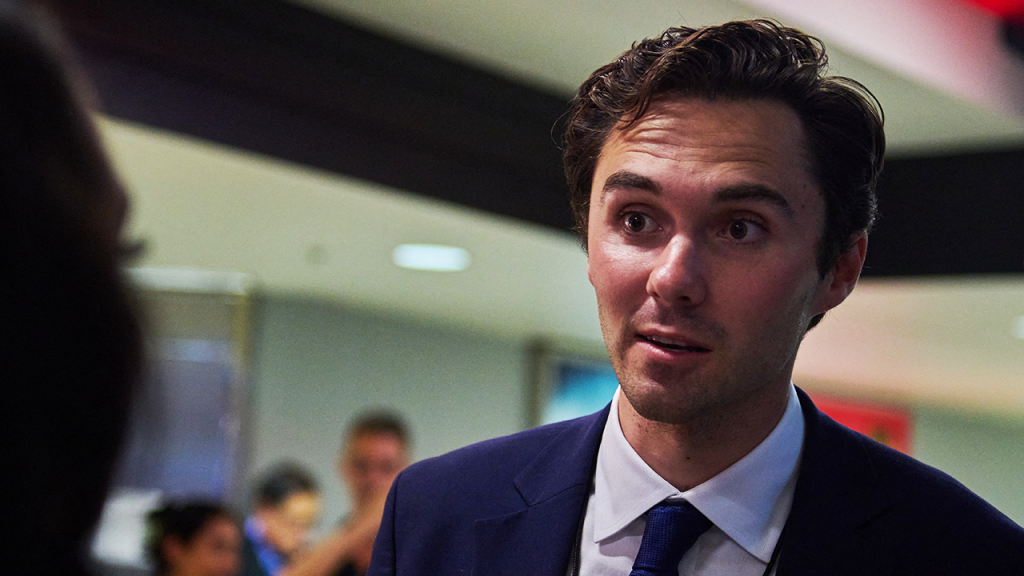Amid increasing tensions within the Democratic Party, a Native American attorney, Kalyn Free, has challenged the vice chair position held by activist David Hogg at the Democratic National Committee (DNC). This controversy stems from Hogg’s recent announcement of a $20 million investment aimed at primary challenges against incumbent Democrats. As the DNC prepares for a virtual meeting to address Free’s complaint, the implications of Hogg’s actions have sparked significant debate within the party surrounding its leadership and electoral strategy.
| Article Subheadings |
|---|
| 1) Challenge to Hogg’s Position |
| 2) Details of the Complaint |
| 3) Hogg’s Ambitious Plans |
| 4) Party Response and Neutrality |
| 5) Broader Implications for the Democratic Party |
Challenge to Hogg’s Position
The recent controversy concerning David Hogg arose after Kalyn Free, a long-time Democratic activist and Native American attorney, lodged a complaint contesting his vice chair position at the DNC. Free’s challenge focuses on alleged discrimination against women of color candidates during the recent officer elections. Hogg secured his position with 214.5 votes, whereas Free’s vote count was significantly lower at 96. The DNC has confirmed that it will address Free’s concerns during a virtual meeting scheduled for May 12, highlighting that such complaints can arise in any election process.
Details of the Complaint
Free’s complaint claims that the DNC engaged in discriminatory practices that marginalized women of color candidates during the officer elections held on February 1. Although Free’s grievances were formally submitted prior to Hogg’s announcement regarding the primary challenges, they have gained heightened importance in light of the party’s current dynamics. In a statement, Free articulated her commitment to fighting for fairness within the party, stating,
“This is about fairness and making sure that three women and the members of the DNC are not disenfranchised.”
The DNC spokesperson has reassured that the election was conducted fairly and that concerns raised will be addressed in due course.
Hogg’s Ambitious Plans
Hogg’s commitment to investigate primaries against incumbent Democrats has elicited substantial discourse both within and outside the party. As a prominent figure in gun control activism and a survivor of the Marjory Stoneman Douglas High School tragedy, Hogg is no stranger to controversy. His tactical approach involves utilizing $20 million from his political action committee, Leaders We Deserve, to fund primary challenges in predominantly Democratic districts. Critics contend that this strategy could divert focus and resources away from combating Republican opponents, as noted by Democratic strategist James Carville, who chastised Hogg’s intentions in a recent interview.
Party Response and Neutrality
In line with the recent upheaval surrounding Hogg’s plans, DNC Chair Ken Martin emphasized the party’s commitment to remaining neutral in primary elections. Martin has issued an ultimatum to Hogg, stating that if he wishes to pursue primary challenges, he must either resign his vice chair position or abandon his PAC’s influence. Martin’s assertion,
“No DNC officer should ever attempt to influence the outcome of a primary election,”
highlights the imperative for DNC officials to act impartially. The DNC is set to review a proposal that would require officials to pledge neutrality in future contests, slated for a vote next month.
Broader Implications for the Democratic Party
The ramifications of this internal dispute extend beyond the DNC’s immediate leadership structure. The party grapples with a growing ideological fracture, particularly among younger activists and established members. Hogg’s bold venture into primary challenges reflects a broader movement among progressive factions within the party aiming to reshape Democratic norms. Observers suggest that this intra-party dynamic could significantly influence the party’s strategy in upcoming elections, especially as they seek to counter the rapid resurgence of the Republican Party under President Donald Trump.
| No. | Key Points |
|---|---|
| 1 | Kalyn Free has challenged David Hogg’s vice chair position, citing discrimination in officer elections. |
| 2 | Hogg received 214.5 votes, whereas Free secured only 96 votes in the recent elections. |
| 3 | David Hogg plans to invest $20 million to primary challenge incumbent Democrats. |
| 4 | DNC Chair Ken Martin emphasized the need for neutrality among party officials. |
| 5 | This internal dispute highlights ongoing ideological tensions within the Democratic Party. |
Summary
The unfolding drama surrounding David Hogg and Kalyn Free’s challenge represents a pivotal moment for the Democratic Party, reflecting its internal conflicts and the evolving landscape of American politics. As the DNC grapples with fundamental questions of leadership and strategy, the resolution of Hogg’s vice chair position and his controversial primary plans will have far-reaching implications, potentially impacting the party’s ability to unite against Republican adversaries in forthcoming elections.
Frequently Asked Questions
Question: What influenced Kalyn Free to challenge David Hogg’s position?
Kalyn Free’s challenge was primarily rooted in claims of discrimination against women of color candidates during the recent DNC officer elections.
Question: What are David Hogg’s plans for primary challenges?
Hogg plans to use $20 million from his political action committee to fund primary challenges against older Democratic incumbents in strong Democratic districts.
Question: How is the DNC responding to the allegations surrounding Hogg?
The DNC has stated it will review Free’s complaint and emphasized its commitment to maintaining neutrality in primary elections, particularly in light of Hogg’s ambitious plans.


